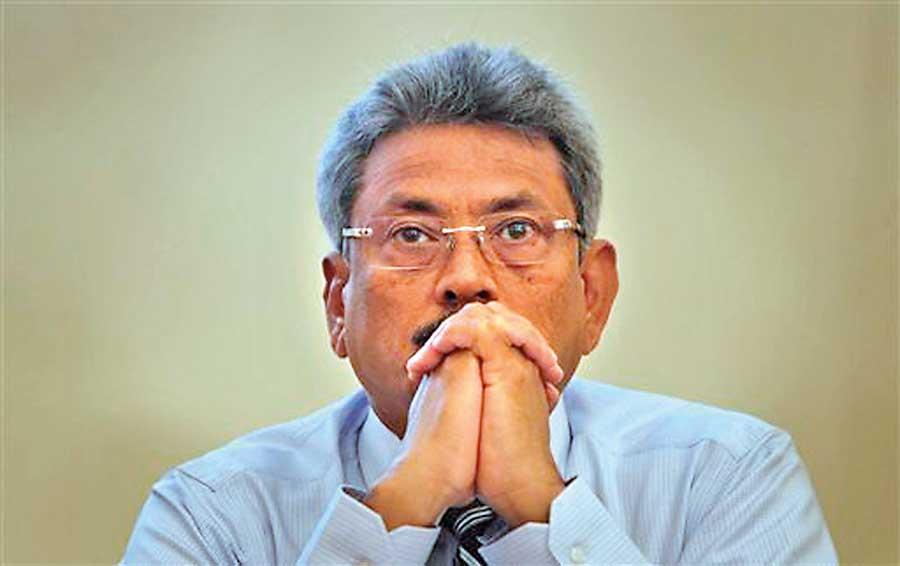Reply To:
Name - Reply Comment
Last Updated : 2024-04-26 06:07:00

 Last week, the Cabinet decided to draft a National Intelligence Act. The Cabinet Spokesman Minister Bandula Gunawardena who announced the decision said the objective was “to mitigate the damage caused to the state intelligence agencies under the Yahapalana government, prevent repetitions and strengthen the State intelligence services to face any threat to National Security.”
Last week, the Cabinet decided to draft a National Intelligence Act. The Cabinet Spokesman Minister Bandula Gunawardena who announced the decision said the objective was “to mitigate the damage caused to the state intelligence agencies under the Yahapalana government, prevent repetitions and strengthen the State intelligence services to face any threat to National Security.”
That is the right decision, communicated in the wrong way. When you colour a national initiative with a political tint, it is likely to be remembered as such for the rest of its existence.
A National Intelligence Act for Sri Lanka will regulate the manner of operations and the exercise of powers of the intelligence agencies within the territory of Sri Lanka and beyond. It is a long-overdue legislation. It should also be a bipartisan national initiative supported by both the government and the opposition. Otherwise, it defeats the purpose.
This columnist is among those who have called for the introduction of a national intelligence act.
This is what I wrote in these pages on May 7th, 2019.
“Sri Lanka needs an Intelligence Service Act. In order to effectively deploy its multiple intelligence agencies, Sri Lanka needs to provide a unified legal framework through a Parliamentary Act…”
“A Sri Lankan Intelligence Services Act should review the current security situation, conceptualise an institutional structure that brings together multiple intelligence services to an unified umbrella, clarify the mandate of each of these agencies to engage particular domestic and international arenas and provide a legal framework for organisation and coordination for intelligence activities and immunity from persecution for intelligence operatives for undertaking mandated intelligence work.”
To do that Sri Lanka does not need to reinvent the wheel. Many countries that encountered the same problem have adopted their own legal provisions. For instance, The Central Intelligence Agency (CIA) of the United States was created by the National Security Act of 1947 and is specifically empowered by the Central Intelligence Agency Act of 1949 (CIA Act). In Britain. MI5, the domestic intelligence service, draws its legal authority from the Security Services Act, 1989, and its foreign arm, State Intelligence Service (SIS) or MI6by the 1994 Intelligence Services Act.
Similarly, during times of increased security risk, special legislations have been adopted to enhance the powers of the intelligence agencies.
For instance, the USA Patriot Act, introduced after 9/11 attacks authorised measures to enhance the ability of domestic security services to prevent terrorism, and enhance surveillance procedures to cover all aspects of the surveillance of suspected terrorists. Though most provisions of the Patriot Act were to expire after four years, it was renewed with limited amendments twice, despite public criticism over curbing civil liberties. It remained law until it was replaced by the Freedom Act of 2015. The latter was a modified version of its predecessor.
At present, there are a number of intelligence agencies in Sri Lanka. They include the State Intelligence Service (SIS), the primary intelligence arm; then there are Criminal Investigation Department (CID),Terrorist Investigation Division (TID), Police Special Branch (SB), etc. Also, there are intelligence arms within each service arm of the defence forces: Directorate of military intelligence as Dte of MI, Directorate of Naval Intelligence (Dte of NI), Office of Air Intelligence (CIO) and State Intelligence and the Special Task Force (STF) Intelligence Branch.
However, except for Adhoc measures, an institutional framework for their coordination does not exist. And, practical means of coordination have been at the mercy of the personal affinities of service commanders and other top brass. For instance, the former commander of the army, Lt. Gen Mahesh Senanayake riled that the Director State Intelligence Service, the Chief of National Intelligence, and the IGP, all top brass from the Police, did not share the intelligence warnings of the Easter Sunday attack with the Army. Also strangely enough, the Army which happened to have the most effective intelligence arm was unaware of the looming islamist threat. Inter-agency cooperation and coordination might have prevented the slaughter of worshippers and tourists on the Easter Sunday.
A National Intelligence Act that designates powers and delaminates functions of the intelligence services would save the national intelligence apparatus from the politicisation of intelligence services and the intelligence itself. That could have prevented intelligence agents being used to abduct journalists and intimidate the dissent in the past. That would also make it easier for the whistle blowers within the security services and elsewhere to alert the authorities when the infractions happen.
The absence of such safeguards and mechanism for oversight in the past had a heavy toll on the reputation of the state intelligence institutions. The sullied reputation and politicization of intelligence agencies under the Mahinda Rajapaksa regime led to its successors to undermine these very services, which needless to say, was proved to be a bad idea.
The political apathy effectively generated a lethargy and indifference within the intelligence community. As a result, the country became a sitting duck for Islamist terrorism.
The new government should learn from the past, and incorporate them into the new act.
Probably the first lesson is to avoid politicisation at all cost. Politicised intelligence service would always be viewed as much less as a national institution, but more as an apparatus of those in political power. They will produce politicised intelligence.
The second is practical and institutional means to enhance coordination and cooperation among the multiple agencies, many of which now operate in overlapping territories.
The third is the question of legal immunity and other guarantees for intelligence agents when carrying out their designated duties.
The fourth is adequate oversight of intelligence agencies by the civilian political leadership through an intelligence committee. It would prevent the abuse of authority that happened in the past all so frequently. Even during the Yahapalanaya, it is now alleged that the head of the Financial Crime Investigation Division (FCID) indulged in blatant abuse of power to extract financial favours.
The fifth is international cooperation and training.
A National Intelligence Bill is a step in the right direction.
However, there are other legal provisions that need to be adopted if the intelligence services are to proactively confront national security threats. (The most likely and immediate of all is Islamist extremism.)
Sri Lanka’s Prevention of Terrorism Act (PTA) is largely discredited domestically and globally, rightly so for the past abuses of the Act. As a result, The Yahapalanaya did not use it. Nor did the current administration during its first two months. Any attempt to resort to it would attract censure from international community. The Yahapalanaya drafted a counter-terrorism bill, which the Pohottuwa when it was in the political opposition opposed claiming it was too soft on terrorists and too harsh on trade unions and political activists. The current administration has announced that it had withdrawn the counter-terrorism bill of the Yahapalanaya.
The Yahapalanaya has been charging the terrorist suspects under the existing penal code. This government too has to resort to the same in the absence of a new legislation. The problem is that the existing legal provisions do not have enough teeth to fight terrorism.
In March 2018, scores of supporters of Mohammed Zahran, the Islamist terrorist ringleader, were arrested over attacking a rally of moderate Sufis. All of them were later released. Two of the released went to become the suicide bombers of the Easter Sunday carnage.
A country cannot fight terrorism without legal provisions that allow sufficiently for preventive detention of terrorist suspects. Sri Lanka’s existing penal code provides no such leverage. Resorting to the PTA is counterproductive and would generate a lot of bad publicity. The government should adopt a replacement to PTA, rather than leaving a vacuum that would be exploited by the terrorists.

Add comment
Comments will be edited (grammar, spelling and slang) and authorized at the discretion of Daily Mirror online. The website also has the right not to publish selected comments.
Reply To:
Name - Reply Comment
US authorities are currently reviewing the manifest of every cargo aboard MV
On March 26, a couple arriving from Thailand was arrested with 88 live animal
According to villagers from Naula-Moragolla out of 105 families 80 can afford
Is the situation in Sri Lanka so grim that locals harbour hope that they coul